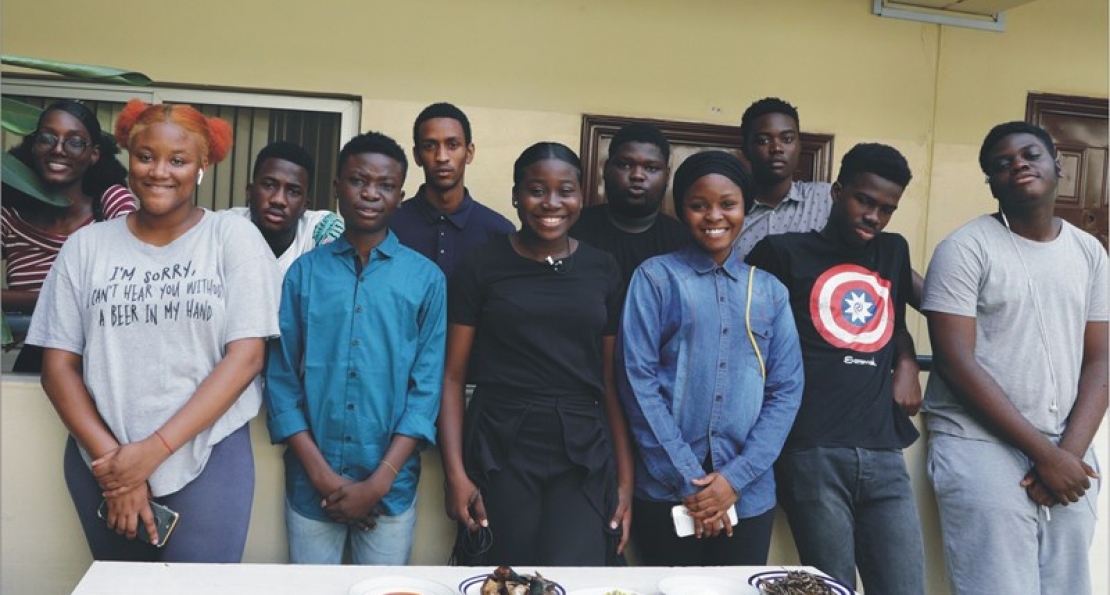In Fall 2019, my freshman composition class participated in a GLAA-supported oral history course connection program. Our peers were in the Universidad San Francisco de Quito, Ecuador, and Flame University, India.
As I actively engaged with my classmates and our partners either through different types of media or shared assignments, I learned more than I initially expected or thought possible. You see, I arrived at AUN from a different university and because of my love for the English language, I was certain I would be able to start the journey of professional fulfillment here. This was my first writing course ever at a university, and I found it amazing in so many ways.
One of the key things I learned is that writing is not all about literature and language. The individual exercises and team tasks also helped me to find my voice and be myself. During this course, I was guided on how to be thoughtful, meaningfully approach questions, and critically reflect with a global perspective. Most importantly, I learned how to articulate my thoughts better, be an intentional creative writer, listen compassionately, and document real-life experiences using multimedia tools.
During this remarkable program, which showed us how to use oral history for community-based and participatory learning, I improved on my English language competencies and interfaced with peers in two continents – South America and Asia. Through the communication platforms we used, we were able to enhance our cultural sensitivities and people-relation skills without sacrificing our own identities or value systems - as we shared our stories and explained our varying perspectives on issues.
When I needed assistance in class about understanding concepts associated with interviewing others using the Abbreviated Life Story Model or the Oral History Metadata Synchronizer (OHMS), we worked as a team to carry each other along with while our instructors provided the necessary mentorship. Through the course connection, I strengthened my skills on how to communicate purposefully with my classmates and institutional partners, and also work well in a team.
Funny enough, working as a team brought some challenges because of our differences but these variances are the very things that unified us as a group, a class, and partners.
From my counterparts in Ecuador and India, I learned about the kind of food they eat, the importance of certain dishes, their general ways of life and their systems of education. To enhance the intercultural experience, they sent us recipes for some of their most popular meals so we could cook them and appreciate their roles in their respective communities. The cooking experience was so much fun and together, we discovered new food ingredients, how to cook foreign delicacies and enjoy them as a class.
Naturally, we wrote about every shared task, as this was still a writing class with specific outcomes for all of us. As a class, we were sent some videos on Netflix for intercultural and topical issues awareness, and we watched them together. We also shared some videos about Nigeria, street foods, AUN and the Nollywood film, Lionheart.
Given that this connection had an oral history component that focused on understanding and documenting the role of food in migrant populations, we also worked with members of the local community. Through engaging discussions structured around open-ended questions, we practiced our interviewing skills and used digital tools we would not have imagined in the syllabus of a conventional writing class. An amazing communications team provided the technical knowhow, and the passion we all developed to make this project a success reinforced the interconnectivity of everything at AUN.
Here we were, students from different majors, building competencies in expository writing, learning digital storytelling skills, reading about recipes, cooking, interviewing, recording, transcribing, interpreting, and appreciating lives outside the familiar. I participated in different activities during this program, and all our efforts culminated in an exhibition we are very proud of. We thank our instructors – Emilienne Akpan (Nigeria), Alejandra Zambrano (Ecuador), and Ravikant Kinsana (India) for taking us on a cultural journey of incredible awareness and capacity building. I hope the course connection program continues because students, faculty and the respective institutions mutually benefit in so many ways - and for me, this is an additional AUN advantage.
By Jakim Bilal Mologoh
Software Engineering major


